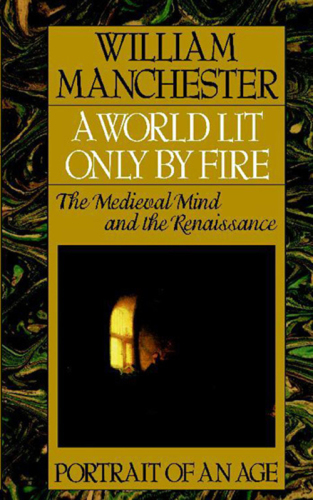
A World Lit Only by Fire
The Medieval Mind and the Renaissance: Portrait of an Age
کتاب های مرتبط
- اطلاعات
- نقد و بررسی
- دیدگاه کاربران
نقد و بررسی

April 27, 1992
Using only secondary sources, Manchester plunges readers into the medieval mind-set in a captivating, marvelously vivid popular history that humanizes the tumultuous span from the Dark Ages to the dawn of the Renaissance. He delineates an age when invisible spirits infested the air, when tolerance was seen as treachery and ``a mafia of profane popes desecrated Christianity.'' Besides re-creating the arduous lives of ordinary people, the Wesleyan professor of history peoples his tapestry with such figures as Leonardo, Machiavelli, Lucrezia Borgia, Erasmus, Luther, Henry VIII and Anne Boleyn. Manchester ( The Arms of Krupp ) devotes much attention to Magellan, whose globe-straddling voyage shattered Christendom's implicit belief in Europe as the center of the universe. His portrayal of the Middle Ages as a time when the strong and the shrewd flourished, while the imaginative, the cerebral and the unfortunate suffered, rings true. Illustrations.

April 15, 1992
The popular biographer of Winston Churchill ( The Last Lion, LJ 5/1/83) and Douglas MacArthur ( American Caesar, LJ 9/1/78) has turned his attention to the Middle Ages, the Renaissance, and the Reformation. It was a hasty move. Under the title "The Shattering," two-thirds of the book purports to deal with the decline of medieval superstition and obscurantism under the brilliant light of the Renaissance; actually, this section is a lengthy catalog of tired salacious tales about the clergy. The final third of the book claims that Magellan's circumnavigation of the globe and proof that the world was round broke forever the power of the medieval mind, a debatable thesis. Based on long out-of-date secondary sources, rife with anachronisms and errors of fact and interpretation, and filled with howlers such as Martin Luther "was also the most anal of theologians . . . this derived from the national character of the Reich," this book will only perpetuate myths long refuted by modern scholarship. The popular audience for whom it is intended deserves much better. Not recommended. Previewed in Prepub Alert, LJ 12/91.-- Bennett D. Hill, Georgetown Univ., Washington, D.C.
Copyright 1992 Library Journal, LLC Used with permission.

May 1, 1993
YA- -An absorbing and readable history, beginning with the collapse of Rome and ending with the redawning of intellectual pursuits in the Renaissance. Manchester's vivid descriptions of the misery and ignorance of the Middle Ages are the background for the second and main section of his book, which he calls the "shattering,"-the collapse of essentially unified thought and the rebirth of the pursuit of knowledge. His last section focuses on Magellan and his historic voyage, described as a primary event in contributing to Western man's changing view of the world. The story of his efforts to obtain backing for his venture is engrossing; the difficulties of the voyage are made real enough to feel.- Philip D. Winters, Thomas Jefferson Sci-Tech, Fairfax County, VA

March 15, 1992
Just as war is too important to be left to the generals, the study of history is too important to leave to historians. To remain vibrant, it needs a new set of eyes, a limber mind unencumbered by preconceptions clamoring for recognition. Thus, while the contestants in the Columbus hullabaloo maintain at least one common position--the Admiral of the Ocean Sea personifies the decisive break with medieval mentality--Manchester, whose usual haunt is twentieth-century biography, disagrees. Ferdinand Magellan deserves the epic honor. To see why, he makes an entertaining excursus on the (depraved) state of Europe qua the Roman Catholic Church in the years prior to Martin Luther's little outburst over the sale of indulgences--a time when, apparently unimpeded by the precepts of Jesus, the hierarchy at Rome kept the ignorant multitude in thrall to its doctrinal certitudes. While the German monk's 95 theses upset this fleshy, gluttonous, and violent scene (illuminated by heretics roasting on an open fire, hence the book's title), immortal greats like Erasmus, Leonardo da Vinci, and Copernicus were also disturbing the universe. But it was Magellan, insists his champion Manchester, who, by proving the rotundity of a rotating earth, pulled together all the doubts besetting the static and immovable medieval conception of man and God. The medieval frame of mind--indifferent to death, no refuge of religious skepticism or doubt, unaware of time or self, prone to spasms of butchery--gets a wonderfully curmudgeonly and one-sided sketch, and though the legions of Manchester's readership still yearn for a concluding volume of his Churchill trilogy, they should be captivated by his resplendent retelling of Western civilization's pivotal sixteenth century. ((Reviewed Mar. 15, 1992))(Reprinted with permission of Booklist, copyright 1992, American Library Association.)

























دیدگاه کاربران